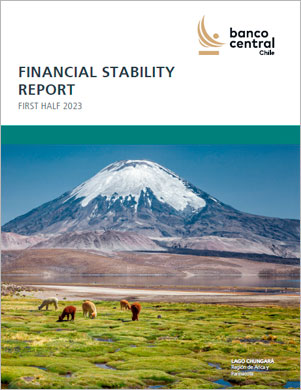Financial Stability Report First Half 2023
Financial Stability Report First Half 2023

Financial conditions have deteriorated worldwide and exhibit an unusual degree of uncertainty regarding their future evolution. After a long period of low interest rates and abundant liquidity, the monetary tightening revealed vulnerabilities in the banking sectors of certain developed economies. The turbulence that began in March following the failure of several banks has been mitigated by the swift and coordinated action of policy makers. Since then, the risks of abrupt asset price corrections and capital outflows have grown, especially in emerging economies. In a context where monetary policy may need to remain tight for longer in the developed world, market sentiment remains fragile regarding these countries’ banks and concerns remain about the extent and magnitude of latent vulnerabilities. Locally, the impact of these events has been limited, as the economy continues to resolve the effects of macroeconomic imbalances accumulated in recent years. In this process, the financial position of households has tightened, and saving rates have turned negative. Meanwhile, firms have been gradually reducing their indebtedness in the aftermath of the pandemic. The greater use of credit cards and credit lines among both households and businesses— has translated into greater exposure to interest rates, while defaults have returned to pre-pandemic levels, and the situation does not suggest the presence of elements of systemic risk. The local banking system has sufficient liquidity and solvency to withstand the stress scenario and —in view of the recent international banking situation— it differs in terms of its business model, regulation, and supervision. During the pandemic years, agents used up their savings and turned to borrowing to navigate the most severe crisis of recent times. The recomposition of their capacities to face new shocks has occurred at different speeds, and it is crucial for this process to go on. Going forward, it is essential to prioritize initiatives that promote saving and strengthen the financial system’s capacity to cushion adverse events.
What does this IEF tell us?

Las condiciones financieras se han deteriorado a nivel global y exhiben un grado de incertidumbre por sobre lo habitual respecto de su evolución futura.

Las condiciones financieras se han deteriorado a nivel global y exhiben un grado de incertidumbre por sobre lo habitual respecto de su evolución futura.
- Tras un largo periodo de bajas tasas y amplia liquidez, el ajuste monetario reveló vulnerabilidades en la banca de ciertas economías avanzadas.
- Las turbulencias iniciadas en marzo, producto de la quiebra de varias instituciones, han sido mitigadas por la rápida y coordinada acción de las autoridades.
- A nivel local, el impacto de estos eventos ha sido acotado.

Los agentes utilizaron sus ahorros y se endeudaron para enfrentar la mayor crisis de los últimos tiempos.
- La economía chilena sigue en ajuste de los desequilibrios macroeconómicos acumulados en años previos.
- En este proceso, la posición financiera de los hogares se ha estrechado, mostrando una tasa de ahorro negativa.
- Las empresas han seguido reduciendo su endeudamiento tras su paso por la pandemia.

La banca local cuenta con holguras suficientes para enfrentar escenarios de tensión.
- Frente a la coyuntura bancaria internacional reciente, la banca en Chile se diferencia en términos de su modelo de negocios, regulación y supervisión.
- En lo próximo, enfrenta mayores requerimientos de capital para fortalecer su posición.

Hacia adelante es fundamental priorizar iniciativas que fomenten el ahorro y fortalezcan al sistema financiero.
- Hacia adelante, es fundamental priorizar iniciativas que fomenten el ahorro.
- También se debe avanzar en fortalecer la capacidad del sistema financiero para amortiguar eventos adversos.
Presentations
Presentación Informe de Estabilidad Financiera Primer Semestre 2023
Conferencia de prensa - Informe de Estabilidad Financiera Primer Semestre 2023
- Informe de Estabilidad Financiera del primer semestre de 2023. Rosanna Costa, Presidenta
- Informe de Estabilidad Financiera del primer semestre de 2023. Rosanna Costa, Presidenta (ABIF)
- Informe de Estabilidad Financiera del primer semestre de 2023. Rosario Celedón, Gerenta de División de Política Financiera
- Informe de Estabilidad Financiera Primer Semestre 2023. Luis Felipe Céspedes, Consejero
- Informe de Estabilidad Financiera Primer Semestre 2023 - Pablo García, Vicepresidente
